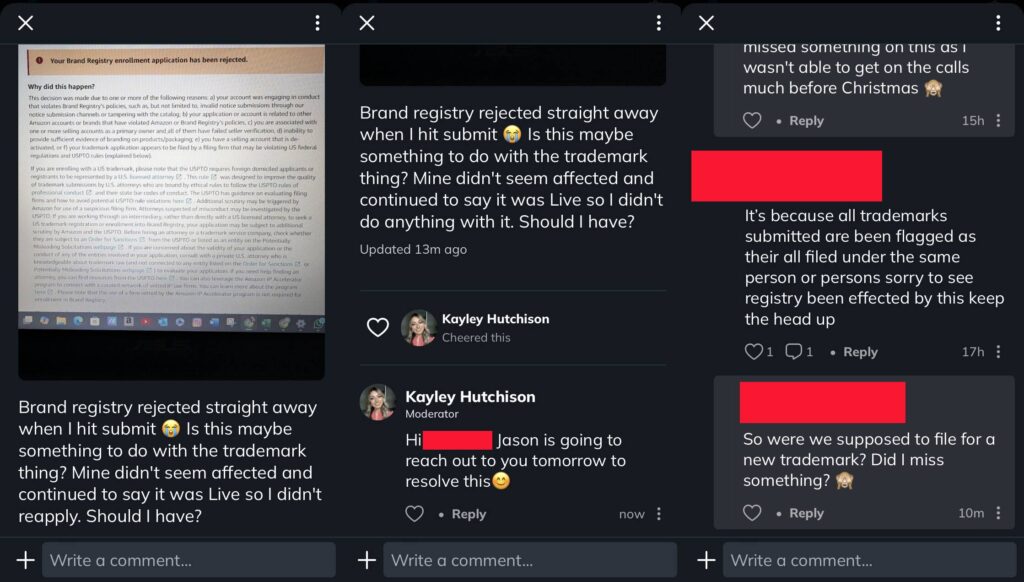Last week during a weekly client call Jason McKay addressed the US trademark controversy. What was meant to reassure worried clients instead escalated tensions, as Jason’s remarks revealed deeper issues with FBABB’s credibility and their mishandling of fraudulent U.S. trademark applications.
In this article, we dissect Jason’s statements, evaluate how they align—or fail to align—with the reality clients are experiencing, and explore why his role in the scandal raises even more serious questions about FBABB’s operations.
Jason McKay’s Statements: Damage Control or Genuine Resolution?
During last week’s meeting, Jason McKay addressed clients about the growing trademark crisis. While his statements struck an optimistic tone on the surface, they failed to tackle key issues and ultimately raised more questions than answers.
1. “A New U.S. Attorney Will Fix This”
Jason announced that FBABB has hired a new U.S. attorney, Jeremy, to address the fallout from their fraudulent trademark filings. While this might appear to be a step in the right direction, it’s a move that comes far too late for many clients who are already dealing with Amazon Brand Registry rejections and significant financial losses.
“We’ve brought in Jeremy, a legitimate U.S. attorney, who has been fully vetted—credentials, certifications, everything has been double-checked. He’ll be handling all refilings and future applications. For every client affected, we’re covering the costs of resubmissions to ensure no one is out of pocket and that their trademarks are properly filed and registered this time. Jeremy will oversee the process from start to finish to ensure there are no more issues like this.”
Despite this pledge, Jason sidestepped a crucial question: why wasn’t a qualified attorney involved from the outset? Clients were led to believe their trademark applications were being handled by competent professionals, only to learn that unlicensed individuals like Maria Zafar were managing these critical legal processes.
2. Blame Shifting to “Canadian Friends”
Jason attempted to redirect responsibility, suggesting that FBABB’s use of Maria Zafar and other unqualified individuals originated from connections with their “Canadian friends.” This vague explanation fails to address FBABB’s obligation to thoroughly vet suppliers and ensure adherence to U.S. legal standards.
“The introduction to Maria came from some friends (i.e. Zab Twins) we worked with in Canada. I think it’s fair to say we didn’t dig as deeply into her credentials as we should have at the time. It’s a lesson learned, and we’re making sure this kind of oversight doesn’t happen again.”
This excuse sidesteps the heart of the problem: FBABB’s leadership knowingly entrusted trademark applications to unverified individuals, prioritising cost savings over protecting their clients’ interests. The admission of inadequate due diligence does little to rebuild trust or mitigate the damage already done.

Jason McKay’s Direct Involvement
The data sheds light on Jason McKay’s deeper role in the trademark scandal. Analysis of FBABB’s trademark filings reveals that Jason McKay’s email address ([email protected]) appears on 93 applications. This points to direct involvement in managing or overseeing these filings, raising critical questions about his accountability.
Adding to the controversy, attorneys whose names appear on these applications have outright denied any connection. One attorney stated:
"I had no knowledge of these filings. My name and contact information were used without my consent, which constitutes a serious breach of professional ethics and federal law."
While Jason’s assurances to refile applications at no cost may offer temporary relief to some clients, they fail to address the systemic misrepresentation and the lasting damage inflicted on those affected.

Key Issues Left Unanswered
1. Amazon Brand Registry Rejections
Jason’s promises to resolve trademark issues fail to address the immediate consequences for clients facing Amazon Brand Registry rejections. Without access to Brand Registry, sellers lose essential protections against counterfeiters and endure heightened competition, which significantly impacts their revenue and market position.
One client expressed their frustration:
"Brand registry rejected straight away when I hit submit. Is this maybe something to do with the trademark thing? Mine didn’t seem affected and continued to say it was live, so I didn’t do anything with it. Should I have?"
The confusion and lack of guidance highlight FBABB’s failure to provide clear communication or proactive support during this crisis.

2. Trust in FBABB
Even with a new attorney now involved, trust in FBABB has plummeted to an all-time low. Clients are left wondering whether Jeremy’s role will genuinely tackle the underlying issues at the heart of the scandal or merely serve as a temporary band-aid for deeper systemic failures.
3. Financial Accountability
Jason reaffirmed that FBABB will cover the costs of refiling invalid trademark applications. However, it remains unclear whether this commitment extends to the additional expenses clients are now facing, including:
- Hiring independent attorneys to audit and refile trademarks
- Lost revenue due to delays in Brand Registry approvals
- Rebranding costs if existing trademarks are invalidated
These unanswered questions leave clients grappling with financial uncertainty while FBABB continues to evade full accountability.
References to Past Scandals
Jason’s deflections during last week’s meeting are emblematic of a broader pattern of misrepresentation and cost-cutting within FBABB. As detailed in previous articles:
- Fraudulent Attorneys: Trademark applications tied to Maria Zafar featured unprofessional email addresses, such as [email protected], and listed addresses with no connection to legitimate legal practices.
- Hidden Costs: Clients were caught off guard by additional fees for services that were marketed as all-inclusive.
- FBABB’s Silence: Darren Campbell, the program’s founder, has yet to publicly acknowledge the trademark scandal or take responsibility for the fallout affecting his clients.
This ongoing pattern of evasion and mismanagement continues to erode trust in FBABB’s operations.

Where's The Accountability FBABB Team?
To regain trust, FBABB needs to act swiftly and transparently:
- Full Transparency: Publish a detailed report outlining all trademark applications affected, including those linked to Jason McKay’s email address.
- Comprehensive Compensation: Offer financial support to cover all client expenses stemming from this scandal, including legal fees, lost revenue, and rebranding costs if necessary.
- Independent Oversight: Bring in a third-party firm to audit FBABB’s operations and ensure compliance with legal and ethical standards moving forward.
As one client aptly summarised:
“We trusted FBABB to handle this professionally. Now, we’re the ones paying the price—financially and emotionally.”
Jason McKay’s statements last week may have been intended to reassure clients, but they fell woefully short of addressing the systemic failures within FBABB. From fraudulent trademark filings to Amazon Brand Registry rejections, the fallout from FBABB’s actions is both far-reaching and severe.
This isn’t just a PR crisis—it’s a full-scale scandal demanding immediate accountability and decisive action. Until FBABB takes meaningful steps to rectify these issues, their credibility will remain in shambles, leaving clients to shoulder the consequences of their negligence.
If you’re an FBABB client affected by this scandal, we urge you to verify your trademark applications, consult a qualified attorney, and demand transparency and accountability from FBABB. Your business deserves better.

